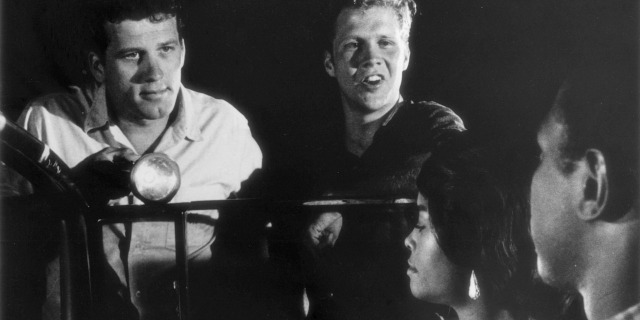 It won’t take a historian to convince you how turbulent the political atmosphere was in the 1960s — simply look at the American cinema for proof. There had been an influx of films with the residue of McCarthyism (The Manchurian Candidate), spy thrillers with the looming threat of the Russians (From Russia with Love), and the deep-seated fear of nuclear apocalypse (Dr. Strangelove). These were films about professionals and about the jobs the men in high positions carried out with our voices and votes at a passive distance. The United States’ personal struggle, one dealt with on a day-to-day basis by the average citizen, was the civil rights movement, a stark attempt of reconciliation of the nation’s troubled past by affirming a real equality for black citizens — a cultural as well as legal battle. Cinema’s visual representation for African Americans at this point was throwing Sidney Poitier into a Hollywood production, allowing him a strong and dignified performance affixed to a liberal message of white guilt and light progressivism. Poitier was not shown in close-up, nor allowed to be much more complex than a representative for his race. Nothing But a Man, in large part made by two Jews, gave actors Ivan Dixon and Abbey Lincoln their close-ups, showed them kiss, brush their teeth, have genuine faults, and above all, be human.
It won’t take a historian to convince you how turbulent the political atmosphere was in the 1960s — simply look at the American cinema for proof. There had been an influx of films with the residue of McCarthyism (The Manchurian Candidate), spy thrillers with the looming threat of the Russians (From Russia with Love), and the deep-seated fear of nuclear apocalypse (Dr. Strangelove). These were films about professionals and about the jobs the men in high positions carried out with our voices and votes at a passive distance. The United States’ personal struggle, one dealt with on a day-to-day basis by the average citizen, was the civil rights movement, a stark attempt of reconciliation of the nation’s troubled past by affirming a real equality for black citizens — a cultural as well as legal battle. Cinema’s visual representation for African Americans at this point was throwing Sidney Poitier into a Hollywood production, allowing him a strong and dignified performance affixed to a liberal message of white guilt and light progressivism. Poitier was not shown in close-up, nor allowed to be much more complex than a representative for his race. Nothing But a Man, in large part made by two Jews, gave actors Ivan Dixon and Abbey Lincoln their close-ups, showed them kiss, brush their teeth, have genuine faults, and above all, be human.
While unmistakably a film about the plight of the black American worker, a theme that would be a capstone in Charles Burnett’s Killer of Sheep, Nothing But a Man‘s production history proves that such a singular reading could not suffice. Michael Roemer (director, co-writer, and co-producer), a Jew having narrowly escaped Germany during its most dangerous time, had been met at Harvard with bouts of casual anti-Semitism. Robert Young (cinematographer, co-writer, co-producer, and later director of ¡Alambrista!) had grown up as a minority Jew in his Long Island community, often identifying with the minority experience in America. They were documentarians for NBC looking for a medium to express their experience, yet also unable to ignore the exclusion of the black experience on the big screen. When penning the screenplay, they included autobiographic details of economic hopelessness and racist persecution, appropriating their plight to the engrossing performances of Dixon and Lincoln, which truly carry the film in Sirkian fashion. When viewing Nothing But a Man, it should not be seen as a few messiahs for black people telling their stories for them, nor should it be read so singularly as historical artifact for black cinema. Its issues are deep, complicated, and awkward; its narrative is formed by the experiences of many different parts of America. This stands today as a film unapologetically political through its tale of personal strife and victory.
Duff’s (Ivan Dixon) workforce comrades, the Section Gang, play checkers with Coca-Cola tops — the soda’s evocation and liberal use places these characters squarely in the South — and smile at each other as if always in jest, despite the first spoken words being, “Go to hell, Frankie.” They are unionized and have a strong backbone. It is hard work, but easy to tolerate given the fraternal atmosphere, just so long as you’re only working for yourself. However, after meeting with a preacher’s daughter named Josie (Abbey Lincoln), Duff is love-struck and begins flirting with her outside one of her father’s services until she is willing to give him a chance. Their relationship is met with innumerable hurdles, beginning with her father, who will not stand for his daughter to be with such a stubbornly independent man. Their family works as a cultural mediator with the town’s white community and has an image to uphold. As any love story goes, Duff and Josie continue seeing each other until Duff reveals that he has a son in Birmingham, his hometown, and wishes to visit him. There, he meets his own father (Julius Harris) for the first time in many years, carrying open whiskey in the middle of the day, offering only one piece of parting advice: “Don’t get married.” Out of rebellion from the drunken mess his father has become (“Pour your own trouble, Will,” his father’s girlfriend retorts), Duff proposes to Josie, moves into a cheap house, and bounces around jobs for some sign of stability. The harsh economic reality is that Duff is always one action away from unemployment, and, in an already limited market for blacks, is seen as a political entity and thus a pariah. After being fired from his final safe haven thanks to the threats from disapproving whites, Duff is overcome with guilt and self-loathing, returning again to Birmingham not as a solution, but so Josie may be “better off”. He meets the ultimate fate of a man who has given up on himself, and with a sobered mind, takes his son (now revealed to probably not be his) and returns to Josie, finally willing to face his problems for his family.
Duff’s story focuses on two words the white people around him love to use against him: “trouble” and “boy”. The reverend will not permit Duff to see Josie as Duff has proven that he will cause “trouble” — a word coded to mean “not acting the way white people want Duff to act.” The reverend has avoided “trouble” his entire life, often bending over to the whim of the white people merely to survive. Duff senses this and calls him out, exhibiting a black pride before the Black Panthers would place it within the cultural mythos. “Trouble” is something attached to Duff that he may be capable of committing, but we never see it. Several whites interrupt the couple’s early kiss, hassling them and leaving with “Don’t start no trouble, boy!” They escape in their cars — personalized pieces of Americana romanticized for white, suburban folk in Rebel Without a Cause, yet used here as a nightmare. The sawmill foreman fires Duff after his remarks of pro-union sentiments because such political fervor may cause “trouble.” When sent as a gas station attendant to retrieve a drunkard’s wrecked car, he is met with polite banter, “boy” sprinkled in the language. The word is enough for Duff to realize the true attitude of the man and remains silent, of course, so he doesn’t cause “trouble.” By this point, the audience knows trouble will find Duff anyway, and his silence is read as disrespect, a refusal to bend to the whim of the white man’s “polite” conversation. Back at the station, he is met with the man’s posse, insulting him, catcalling his wife, constantly using the opprobrious “boy,” until Duff can no longer be passive and verbally lashes back. The posse threatens the owner that they will destroy the gas station if Duff is not immediately fired. The aggressive, intrusive, racist, and ultimately violent posse think Duff might be, you know, trouble.
Those two words carry on what was visually evident in the recent 12 Years a Slave. Whereas Michael Fassbender’s Edwin could freely whip Chiwetel Ejiofor’s Solomon, the men here only have the power of the word “boy,” so it is used often. Where actual slavery kept Solomon in his harrowing condition, “trouble” can be evoked as a way of keeping Duff out of work and on a feeble paycheck. “Trouble” is seemingly imminent, yet never seen nor enacted by Duff; instead, it is used by white people against white people for keeping proud blacks around. Both films seek to show the effect of institutionalized racism — how black people can become fodder for white people’s personal troubles simply by being inferior within the system. To Edwin, they are property, able to be raped or beaten when he is turned from his wife or angry. In Nothing But a Man, they are expendable capital — a workforce that may be put aside if broken (read: standing up for themselves) or causing trouble (read: being locally political). When pushed too far, Duff slams Josie to the ground (Lincoln later recounts that she “took that fall for all black women.”); it’s inexcusable, which is the emotional catalyst for his running away. When he sees his father for the final time, the opposite of the passive reverend, a man who so opposes being subservient that he drinks away his responsibility and guilt, Duff refuses to see his fate before him. His taking his son back is a personal decision, yet almost political in aversion to his father. The family reconciles their troubles and yet are ultimately optimistic: “Ain’t gonna be easy, baby, but it’s gonna be all right. Baby, I feel free inside.”
It is easy to give a one-sided political reading to this story, even knowing of the Jewish empathy in its undertones. Yet Ivan Dixon and Abbey Lincoln refuse to be pigeonholed as faces for black America — they are resolutely Duff and Josie, complicated characters with aspirations and tics and failures. Duff likes his Coke in a bottle, not realizing that the glass placed in front of him might be useful; he smiles when he is happy and when he is cursing — his eyes tell us how to feel. Josie looks down, bites her lip, and bashfully engages Duff — it’s easy to tell that she is in love. Lincoln, a jazz singer, is masterful in crafting Josie, her improvisation shining through and giving a rare humanity only seen in cinéma vérité. This is not a rare comment, as Roemer and Young implement stark contrast and a space for performance that gives it a mixture of their previous work with NBC and the revolutionary independent style of John Cassavetes. It evokes an era of the turbulent and personal politics of recent American history while giving preference to its characters rather than its message. This is what humanistic filmmaking looks like.
— Zach Lewis








